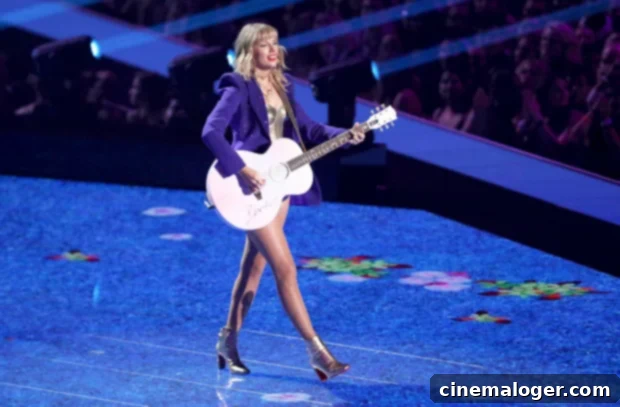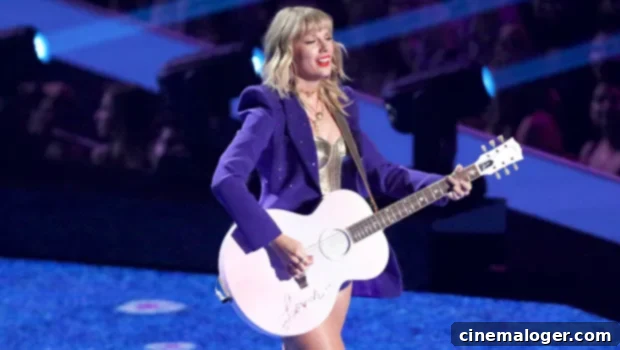Taylor Swift’s Re-Recorded ‘Love Story’ Snippet Sparks Excitement and a New Era for Artistic Freedom
For devoted fans of Taylor Swift, the festive season arrived ahead of schedule with an exhilarating announcement. The globally celebrated singer officially unveiled the very first preview of her highly anticipated re-recorded rendition of “Love Story,” her iconic 2008 hit. This initial glimpse into her ambitious re-recording project has sent a wave of excitement through her fanbase, signaling the beginning of a significant new chapter in her illustrious career.
This thrilling reveal came mere days after the surprise release of her cinematic experience, Folklore: The Long Pond Studio Sessions, exclusively on Disney+. Taylor Swift, a multi-Grammy Award winner, has been meticulously working on the monumental task of re-recording the extensive catalog of songs from her first six studio albums. This undertaking was prompted by the controversial sale of her original master recordings to her former nemesis, Scooter Braun, in June 2019, a transaction that occurred without her prior knowledge or consent. This move ignited a passionate public discourse on artist rights and ownership within the music industry, making Taylor’s re-recording project a powerful statement of artistic empowerment.
The Genesis of a Movement: Reclaiming Her Music
The decision by Taylor Swift to re-record her entire back catalog is not merely a creative endeavor; it is a profound declaration of artistic independence and a calculated response to a situation she openly described as “unconscionable.” The saga began when Scooter Braun’s Ithaca Holdings acquired Big Machine Records, the label to which Taylor was originally signed, along with the master recordings of her first six albums. These masters represent the sound recordings themselves, the definitive versions of her songs. For artists, owning their masters grants significant control over how their music is used, licensed, and monetized.
Taylor Swift had repeatedly expressed her desire to purchase her masters, but alleged she was never given the opportunity or that the terms offered were prohibitive. The acquisition by Braun, with whom Swift had a contentious history, was particularly painful for her, leading her to describe it as her “worst case scenario.” She felt her life’s work had been sold out from under her, without her input or ability to control its future. This dispute quickly garnered international attention, highlighting the often-complex and challenging relationship between artists and record labels regarding ownership and control of their creative output. By re-recording her music, Swift aims to create new master recordings that she fully owns, effectively devaluing the original masters held by Braun’s company (which were later sold again to Shamrock Holdings for an estimated $300 million).
“Love Story” Reimagined: The First Taste of Taylor’s Version
On December 2, 2020, Taylor Swift took to social media to share the exciting news, revealing that the first snippet of her re-recorded music would feature in a commercial created by her good friend, actor Ryan Reynolds. “Okay so while my new re-records are NOT done, my friend @VancityReynolds asked me if he could use a snippet of one for a LOLsome commercial he wrote,” Taylor tweeted, immediately captivating her millions of followers. She then added, “So…here’s a sneak peak of Love Story! Working hard to get the music to you soon!! https://t.co/0vBFXxaRXR”
Okay so while my new re-records are NOT done, my friend @VancityReynolds asked me if he could use a snippet of one for a LOLsome commercial he wrote so…here’s a sneak peak of Love Story! Working hard to get the music to you soon!! https://t.co/0vBFXxaRXR
— Taylor Swift (@taylorswift13) December 2, 2020
The choice of “Love Story” for the inaugural preview was particularly poignant. This track, originally released in 2008 as the lead single from her second studio album, Fearless, was a massive crossover hit that propelled Taylor Swift into global superstardom. It skillfully blended country storytelling with pop sensibilities, endearing her to a vast and diverse audience. Presenting a re-recorded version of such a beloved and defining song was a strategic move, ensuring maximum impact and immediate recognition for this new era of her music. Fans eagerly anticipated hearing how the song, while maintaining its core essence, might subtly reflect the maturity and evolving vocal prowess of the artist.
A Match Made in Commercial Heaven: Ryan Reynolds and Mint Mobile
The “LOLsome commercial” Taylor referenced was for Mint Mobile, the telecommunications company co-owned by Ryan Reynolds. The advertisement itself was a darkly humorous and fitting commentary on the tumultuous year that was 2020. In the commercial, Reynolds humorously portrayed a devil who finds a bizarre, yet undeniable, true love with a young woman, symbolizing the chaos and unexpected connections of the year. As the re-recorded snippet of “Love Story” played in the background, Reynolds’ devil character quipped, “I just don’t want this year to end,” a line imbued with ironic humor given the global challenges of 2020.

The couple in the commercial was depicted posing in front of a literal dumpster fire, with flaming fireballs descending towards Earth, serving as a darkly comedic and universally relatable metaphor for the year. This unconventional and witty debut for a re-recorded track added another layer of intrigue and buzz, demonstrating Taylor Swift’s innovative approach to her project and her ability to merge artistic announcements with pop culture moments.
A Month of Triumphs: From Disney+ to Grammy Nominations
The unveiling of the “Love Story” snippet capped off an incredibly eventful and successful period for Taylor Swift. Just weeks prior, on November 16, she had officially confirmed to her followers that the re-recording process was underway. She tweeted, “I have recently begun re-recording my older music and it has already proven to be both exciting and creatively fulfilling.” She expressed her enthusiasm, adding, “I can’t wait for you to hear what I’ve been dreaming up.” This confirmation had already ignited fervent anticipation among her fanbase.
Beyond the re-records, November also saw the surprise release of Folklore: The Long Pond Studio Sessions, an intimate concert film on Disney+ that offered fans an exclusive look into the creation of her critically acclaimed album, Folklore. This cinematic experience provided a deeper connection to the album, showcasing her creative process with collaborators Aaron Dessner and Jack Antonoff in a serene, remote setting.
Adding to her list of achievements, Taylor Swift received an impressive six Grammy Award nominations for the upcoming 2021 ceremony. This included a coveted nomination for Album of the Year for Folklore, a category she had narrowly missed for her two previous albums, Lover and Reputation. Her return to such a prominent category underscored the critical success and widespread appeal of her indie-folk pivot. Her previous wins for Album of the Year for Fearless and 1989 already solidified her status as a Grammy favorite, and her documentary, Miss Americana, openly detailed her intense desire to secure a third win in this prestigious category, further fueling excitement for the 2021 awards. With such momentum, hopes were high that 2021 would indeed be another landmark year for Taylor Swift.
The Road Ahead: Anticipation and Artistic Legacy
The re-recording project is far from over, with five more albums – Taylor Swift, Speak Now, Red, 1989, and Reputation – awaiting their “Taylor’s Version” release. Each subsequent release is expected to build on the excitement generated by “Love Story,” with fans speculating about which tracks will be previewed next and what “vault” tracks (songs written during the original album’s era but never released) might accompany them. This endeavor is more than just re-recording; it’s a profound reclaiming of her narrative, her art, and her legacy.
Taylor Swift’s decision has also ignited a broader conversation within the music industry about artist rights, intellectual property, and fair compensation. By taking such a public and decisive stance, she has empowered other artists to consider their own ownership and control over their work. Her project serves as a powerful testament to an artist’s enduring connection to their creations, demonstrating that a deep bond with one’s art can inspire extraordinary measures to protect it. As she meticulously works to bring her music home, the world watches with bated breath, eager to celebrate each new “Taylor’s Version” as a victory for artistic freedom and a gift to her dedicated fanbase.
